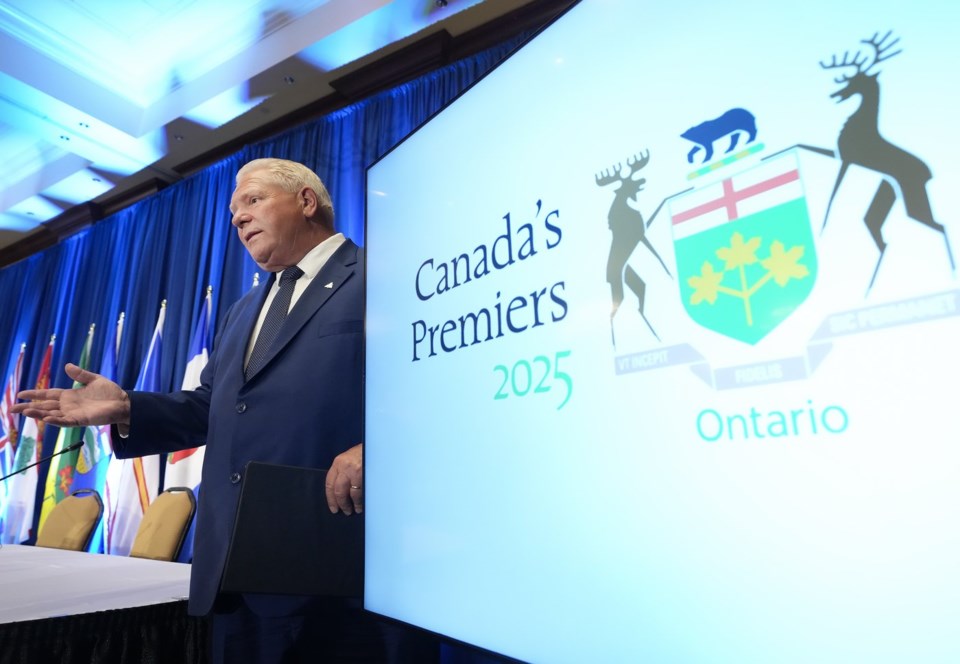HUNTSVILLE, ONTARIO, CANADA — Saskatchewan Premier Scott Moe wrapped three days of meetings with his fellow premiers and Prime Minister Mark Carney Wednesday with a message he admitted he wouldn't have sent over the past decade.
"We can be proud of the work our federal government is doing, in fairness," Moe said.
Moe has been one of the federal Liberal government's most vocal critics in recent years — and criticism of Ottawa is usually guaranteed when provincial leaders gather.
But as the country faces down U.S. President Donald Trump's trade war, the elbows-up, Team Canada approach seems to be winning out under Carney's government.
Ontario Premier Doug Ford praised the prime minister at every opportunity Wednesday, calling him a gentleman, humble and a brilliant businessman.
The premiers joked around, slapped each others' backs and dined at Ford's cottage this week. Carney slept at the cottage on Monday before joining the Council of the Federation meetings in Huntsville, Ont., on Tuesday for a discussion about trade talks with the U.S.
Premiers revealed little of what they learned in those discussions, with Aug. 1 fast approaching. That's the deadline Trump has set to raise tariffs on some Canadian goods to 35 per cent, and the day by which Carney has said he wants to strike a deal with the U.S.
Alberta Premier Danielle Smith said the Americans are signalling they will not start renegotiating the Canada-U.S.-Mexico Agreement on trade until 2026, something she called disappointing.
But Smith said Canada is working toward deals on specific sectors Trump is targeting, like vehicles, steel and aluminum, and lumber.
"If we can come up with some kind of common arrangement on those issues, those sectoral agreements by Aug. 1, we'll look at that as a win. And if it takes a little bit longer to renegotiate the Canada-U.S. free trade agreement to make sure that we get it right, then I'm supportive of that," Smith said.
The prime minister and the premiers downplayed the value of getting a deal done soon to avoid further U.S. tariffs, saying they want the best deal possible regardless of timing.
A number of provinces and territories have signed agreements to open up internal trade, while others have committed to building pipelines to get oil and gas to new markets.
"No other group of premiers, as long as I can ever remember, have been able to sign 11 (memorandums of understanding)," said Ford, who is this year's chair of the Council of the Federation.
The premiers did release a list of things they said they want Ottawa to address.
In a statement issued Wednesday, they called on the federal government to improve Canada's trading relationship with China.
"You know what Churchill said, our enemy of our enemy is our friend, and I don't consider Americans the enemy, but right now President Trump himself is acting like the enemy," Ford said.
The friction dates back to last fall, when Canada imposed a 100 per cent tariff on Chinese electric vehicles — matching a move by the Biden administration in the U.S. — and levies on a range of other goods, including EV batteries and parts, critical minerals, solar panels and semiconductors.
China hit back with 100 per cent tariffs on imports of Canadian canola oil and meal, and a 25 per cent levy on some pork, fish and seafood products.
"As long as China plays fair and doesn't undercut our markets, be it the auto sector or any sector, I have no problem dealing with them because we're already dealing with them," Ford said, pointing out that Ontario imports about $40 billion worth of Chinese goods and exports back about $3 billion.
The premiers say they want the federal government to work toward removing Chinese tariffs from Canadian canola, peas, pork and seafood.
Manitoba Premier Wab Kinew said that while the relationship with China is complicated, the two countries must talk to each other.
"We have to have engagement," he said. "We can't turn away from the rest of the world, especially given what's going on with Mr. Trump."
New Brunswick Premier Susan Holt said she's happy that Canada and China are now in active talks toward a trade deal.
"Given that we're now negotiating a completely new relationship with the U.S., we can get back to the table with China to work to remove the seafood tariffs that New Brunswickers are experiencing," she said.
Moe and Ford said they are worried about steelworkers in their respective provinces, with three major steel plants feeling the brunt of U.S. tariffs on steel and concerns about China dumping steel into the market through proxy countries.
The federal government announced protectionist and anti-dumping measures targeting Chinese-made steel last week.
The premiers are also asking the federal government for changes to the bail system and more money for health care.
B.C. Premier David Eby insisted health care and the cost of living are perennial priorities for provincial governments, even though health didn't come up at the meeting with Carney.
"We have to be able to do multiple things at once in this country," he said.
The premiers called for more action on immigration and said they're looking at ways to exercise more authority over that file.
Ford said Smith told her fellow premiers that Section 95 of the Constitution allows provinces to pass legislation related to immigration.
He said nearly 100,000 asylum seekers came to Ontario alone last year, and while many people want to work, it can take years for them to obtain work permits.
"We will be issuing our own work permits," Ford said.
— Written by Liam Casey in Huntsville, Ont., and Sarah Ritchie in Ottawa with files from Hina Alam in Fredericton
This report by The Canadian Press was first published July 23, 2025.
The Canadian Press




